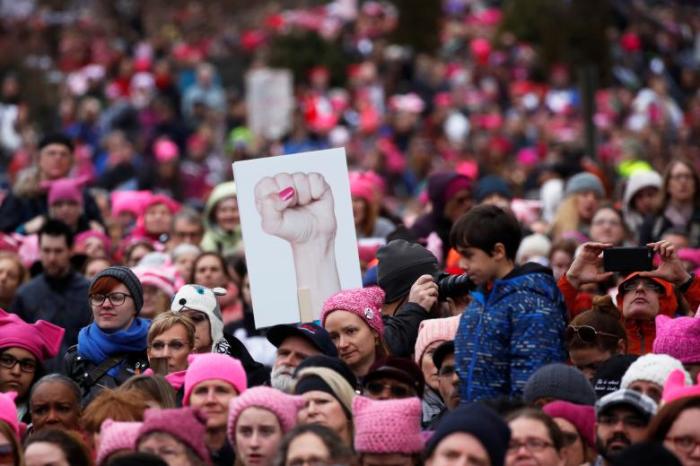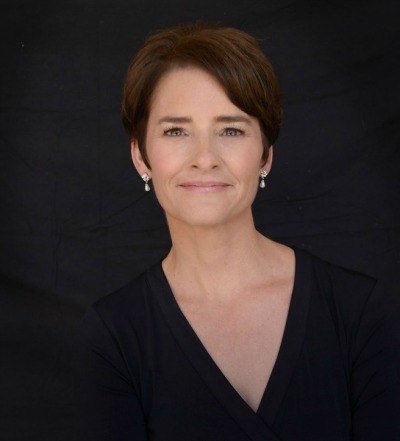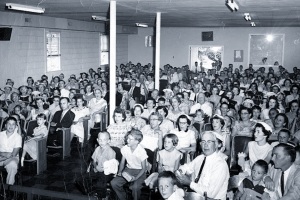Does Modern Feminism Have a Misogyny Problem?
An Interview With Julie Roys, Author of 'Redeeming the Feminine Soul: God's Surprising Vision for Womanhood'

Feminism, in all of its forms since the sexual revolution of the 1960s, hasn't liberated women but has instead attempted to eradicate the nature of womanhood in favor of a type of androgyny in which women function more like men, says Julie Roys, author of Redeeming the Feminine Soul: God's Surprising Vision for Womanhood.
By adhering to a "false vision of womanhood," feminism has rejected the fullness of what women have to offer and set them on a path of self-destruction that reflects a form of misogyny prevalent in the modern movement. And churches are not immune to this, Roys adds, noting that many egalitarian and complementarian denominations practice their own forms of misogyny.
In many ways, the feminist movements that disparage motherhood and sexual purity have won, but the war isn't over, Roys contends, and now it's time for women — and men — to embrace a new feminist movement that aligns with what God has created us to be.
In her book, Roys, who hosts the national talk show "Up For Debate" on the Moody Radio Network, lays bare her struggles within complementarian churches and past disdain for her own femininity and how she ultimately found redemption in true womanhood.
To begin, let's define some terms from Roys' book and Q&A with The Christian Post.
Egalitarians believe men and women are equal in worth and equal in function, and argue that male hierarchy is a result of the Fall.
Complementarians teach that women and men are equal in worth, but different in function. They argue that male hierarchy is part of God's created order established before the Fall.
First-wave feminism in the late 19th and early 20th century was consistent with Christianity and focused on women's suffrage — the right to vote — "to own property (if married), and to pursue higher education and certain professions." This feminism didn't diminish women's roles in the family or as mothers.
Second-wave feminism began in the 1960s and was popularized by women like the late Betty Friedan (co-founder of the National Organization of Women and NARAL, an abortion rights group), and diminished femininity and women's roles as mothers. These feminists prioritized careers and self-fulfillment outside of the home, and are pro-choice.
Third-wave feminism was influenced by the sexual revolution, but unlike second-wave feminism, it embraced pornography and saw "unrestrained sexual expression as essential to women's freedom." This brand of feminism has promoted the hookup culture, where casual sex precedes relationships. This feminism also embraced alternative LGBT sexual lifestyles.
Fourth-wave feminism "is all about 'intersectionality' — about identifying how forces that oppress one group of people may interact or overlap with the forces that oppress other groups. Fourth-wave feminists tend to be young and align themselves with groups they perceive to be similarly oppressed as women," Roys explains in the book.
"Essentially fourth-wave feminism results when feminism meets identity politics. Identity politics asserts that one's identity is largely defined by race, class, or gender/sexuality — and that one's politics is largely shaped by membership in one of these groups."
CP's Q&A with Julie Roys:
CP: You describe second-wave, third-wave and fourth-wave feminism as examples of "the mess humans create when they bypass God's design and attempt to create their own," and show how these movements — unlike first-wave feminism — reject womanhood and how each has harmed society. You also call for a new feminism movement or true feminism. Will you describe what this entails and what women, and men, need to do to achieve this?

Roys: Feminism is failing because it has a false vision of womanhood and a wrong strategy for ending the oppression of women. Though Gloria Steinem proudly proclaimed, "We're becoming the men we wanted to marry," God didn't design women to be men. And becoming like them requires women to die to something essential in their souls.
God made women to nurture and to love, and to flourish in their ability to mother both biological and spiritual children. A true feminism would recognize this, and seek to restore motherhood in the eyes of the culture, the Church, and mothers themselves. It would also reject any false androgyny, and the notion that fathers can substitute for mothers, or that men and women are functional equivalents.
This feminism would also address the oppression of women in all its forms. Yet instead of rejecting male leadership, it would seek to redeem it. It would call on men to use their power and strength to protect women and children and to create space for them to thrive. It would also urge men to value the feminine on par with the masculine, and to treat women as necessary allies, not mere assistants.
CP: Studies have shown that women are less happy and more stressed than their mothers and grandmothers were in the 1970s. As you noted, this can be attributed to the fact that society pressures women to act like men, and delay marriage and starting a family to the point when it might be too late. Thus, second-wave feminism's push for women to reject what they were created to be has failed both women and society.
What is your advice for high school and college-aged girls to help them not succumb to the messages of second, third, and fourth-wave feminism and embrace what God has created them to be?
Roys: The key to resisting the messages of the last three waves of feminism is an awareness of the soul-killing misogyny inherent in all of them. Literally, misogyny means the hatred of women. But there's also a more stealth form of misogyny, which manifests as a hatred or devaluation of the feminine, and this misogyny is rife within modern feminism.
In second-wave feminism, this stealth misogyny is seen in the movement's rejection of motherhood. Betty Friedan, who's credited with launching second-wave feminism, actually compared women who dream of being housewives to the "millions who walked to their own death in the concentration camps." This negative attitude toward motherhood is so pervasive in our society that many young women are infected with it without even realizing it.
Third-wave, or "sex positive," feminism promotes misogyny by convincing women that misusing their body sexually is actually key to their liberation. Instead of recognizing that the hookup culture reduces women to mere sex objects, it encourages women to participate in it. Fourth-wave feminism promotes misogyny by erasing womanhood altogether, reducing gender to a social construction and denying fundamental biological realities.
Young women need to reject these feminist lies, and instead of hating, misusing, or denying their womanhood, they need to cherish and embrace it.
CP: In Chapter 6 you describe how both egalitarian and complementarian churches exhibit different forms of misogyny. Does this surprise people when you point this out?
Roys: Yes, it especially surprises egalitarians. They see themselves as the champions of women's rights and enemies of misogyny, and they're completely blind to their bias against their own gender. But sadly, egalitarians often don't value feminine virtues like nurture and an intuitive way of knowing on par with masculine virtues like power and a rational way of knowing. In these circles, women are respected, but often only as they behave like men.
On the other hand, complementarians acknowledge women's uniqueness, but they don't necessarily value and cherish that uniqueness. They often look on feminine virtues condescendingly. And they sometimes place women in a hyper-feminine box, failing to affirm women's full humanity and gifting.
So misogyny works its way into both churches. That's why I say egalitarianism and complementarianism are often just two sides of the same misogynistic coin. Sadly, people in both camps are completely unaware of their misogyny. Hopefully the book will begin building that important awareness so we can address it.
CP: You mention in your book that you never thought you could become complementarian, but reading Pope John Paul II's Theology of the Body erased your objections because it shows how men and women function in concert rather than competition, and together reflect the glory of God.
If you had read TOB before you were married, do you think you would have struggled less with egalitarianism versus complementarianism within marriage and the Church?
Roys: I didn't struggle with complementarianism in my marriage as much as I struggled with it in the church. Though I occasionally chaffed against the notion that my husband was the leader of our family, he always treated me as an equal and cared about me using my gifts, so his leadership didn't feel restrictive or burdensome.
In the church, however, I often felt like a second-class citizen. Because I was a woman, I was barred from doing ministry in certain contexts. I also received less training from my pastors than my male counterparts, and sometimes felt disrespected or even invisible.
Reading Theology of the Body gave me a vision of gendered complementarity that was completely different than the one I had experienced in the church. Instead of focusing on sex roles and what women can't do, TOB emphasizes the awesome spiritual realities men and women together reflect, fundamentally changing the emphasis and application of complementarianism. Sadly, though, most complementarian churches don't function according to this model, so I think I would have struggled regardless.
CP: Would you recommend that evangelicals read Theology of the Body whether they are single, married or committed egalitarians?
Roys: Absolutely! It's so powerful and recovers a biblically orthodox understanding of sexuality and gender that's so necessary today. However, Theology of the Body, which is a compilation of sermons by John Paul II, is a bit heady and academic for many lay people. In Redeeming the Feminine Soul, I explain this profound theology in layman's terms so it's more accessible. Another book that does that as well is Covenant of Love, by Richard M. Hogan and John M. LeVoire.





























